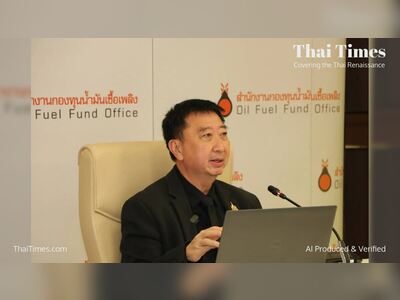
Thailand Faces Workforce Evolution Amid Economic Challenges
As automation and AI skills become vital, the Thai government and businesses seek to adapt to a changing labor market.
Thailand's economy is currently navigating significant challenges characterized by ongoing layoffs and shifts in labor demands across various sectors.
Recent statistics indicate a persistent decline in domestic purchasing power, alongside external pressures stemming from global trade tensions.
As the job market remains uncertain, businesses are urging the government to accelerate the enhancement of workforce skills to align with both local and international economic needs.
The manufacturing sector, particularly in automotive and auto parts, is experiencing a contraction.
Tanit Sorat, vice-chairman of the Employers' Confederation of Thai Trade and Industry, highlighted that the automotive industry is facing a downturn in sales.
Last year, domestic vehicle sales fell by 26.1% when compared to the previous year, primarily due to stringent lending criteria from banks concerned about increasing household debt levels.
This situation raises concerns regarding future employment stability within the sector, despite predictions that significant unemployment growth may not occur in 2024.
In the residential real estate market, developers have begun reducing their workforce in response to prolonged market uncertainties.
Prasert Taedullayasatit, president of the Thai Condominium Association, reported that many residential developers have initiated layoffs to cut operational costs after poor performance in recent years, highlighting the reactive nature of staffing adjustments in the context of declining revenues.
Parallel to these developments, the demand for expertise in artificial intelligence (AI) is gaining momentum across multiple sectors.
Google Thailand's country director, Jackie Wang, noted the rapid technological transformations occurring within industries, emphasizing the importance of AI in enhancing human capabilities rather than replacing them.
To prepare the workforce, Ms. Wang advocated for foundational skills development in communication and critical thinking, as well as practical training programs to better align the Thai workforce with emerging tech trends.
Google has initiatives in place that have already equipped over 3.6 million Thais with tech skills over the past five years.
In conjunction with technological advancements, the restaurant industry is also responding to labor shortages by adopting automation technologies.
The president of the Thai Restaurant Association, Thaniwan Kulmongkol, indicated a rising number of establishments are implementing self-service systems to mitigate reliance on staff, even as there remains a continuous need for employees to manage and monitor technological operations.
Labour Ministry data recorded approximately 40.1 million employed individuals in Thailand as of 2024, with the unemployment figure hovering around 390,000.
The sectors observing the most substantial demand for workers include wholesale and retail trade, automotive services, and manufacturing.
Sanan Angubolkul, chairman of the Thai Chamber of Commerce, underscored disparities in workforce quality and the urgent need for improved educational frameworks to enhance worker productivity.
A significant transition towards AI and automation demands a reconsideration of existing educational structures, with suggestions for establishing AI training institutes to prepare the workforce for future labor market demands.
Employers continue to express the necessity for human qualities—creativity, communication, and problem-solving—which are integral yet not replicable by AI technologies.
As the workforce evolves, Thailand stands at a pivotal moment necessitating proactive adaptation to meet the changing landscape of employment.
Recent statistics indicate a persistent decline in domestic purchasing power, alongside external pressures stemming from global trade tensions.
As the job market remains uncertain, businesses are urging the government to accelerate the enhancement of workforce skills to align with both local and international economic needs.
The manufacturing sector, particularly in automotive and auto parts, is experiencing a contraction.
Tanit Sorat, vice-chairman of the Employers' Confederation of Thai Trade and Industry, highlighted that the automotive industry is facing a downturn in sales.
Last year, domestic vehicle sales fell by 26.1% when compared to the previous year, primarily due to stringent lending criteria from banks concerned about increasing household debt levels.
This situation raises concerns regarding future employment stability within the sector, despite predictions that significant unemployment growth may not occur in 2024.
In the residential real estate market, developers have begun reducing their workforce in response to prolonged market uncertainties.
Prasert Taedullayasatit, president of the Thai Condominium Association, reported that many residential developers have initiated layoffs to cut operational costs after poor performance in recent years, highlighting the reactive nature of staffing adjustments in the context of declining revenues.
Parallel to these developments, the demand for expertise in artificial intelligence (AI) is gaining momentum across multiple sectors.
Google Thailand's country director, Jackie Wang, noted the rapid technological transformations occurring within industries, emphasizing the importance of AI in enhancing human capabilities rather than replacing them.
To prepare the workforce, Ms. Wang advocated for foundational skills development in communication and critical thinking, as well as practical training programs to better align the Thai workforce with emerging tech trends.
Google has initiatives in place that have already equipped over 3.6 million Thais with tech skills over the past five years.
In conjunction with technological advancements, the restaurant industry is also responding to labor shortages by adopting automation technologies.
The president of the Thai Restaurant Association, Thaniwan Kulmongkol, indicated a rising number of establishments are implementing self-service systems to mitigate reliance on staff, even as there remains a continuous need for employees to manage and monitor technological operations.
Labour Ministry data recorded approximately 40.1 million employed individuals in Thailand as of 2024, with the unemployment figure hovering around 390,000.
The sectors observing the most substantial demand for workers include wholesale and retail trade, automotive services, and manufacturing.
Sanan Angubolkul, chairman of the Thai Chamber of Commerce, underscored disparities in workforce quality and the urgent need for improved educational frameworks to enhance worker productivity.
A significant transition towards AI and automation demands a reconsideration of existing educational structures, with suggestions for establishing AI training institutes to prepare the workforce for future labor market demands.
Employers continue to express the necessity for human qualities—creativity, communication, and problem-solving—which are integral yet not replicable by AI technologies.
As the workforce evolves, Thailand stands at a pivotal moment necessitating proactive adaptation to meet the changing landscape of employment.











